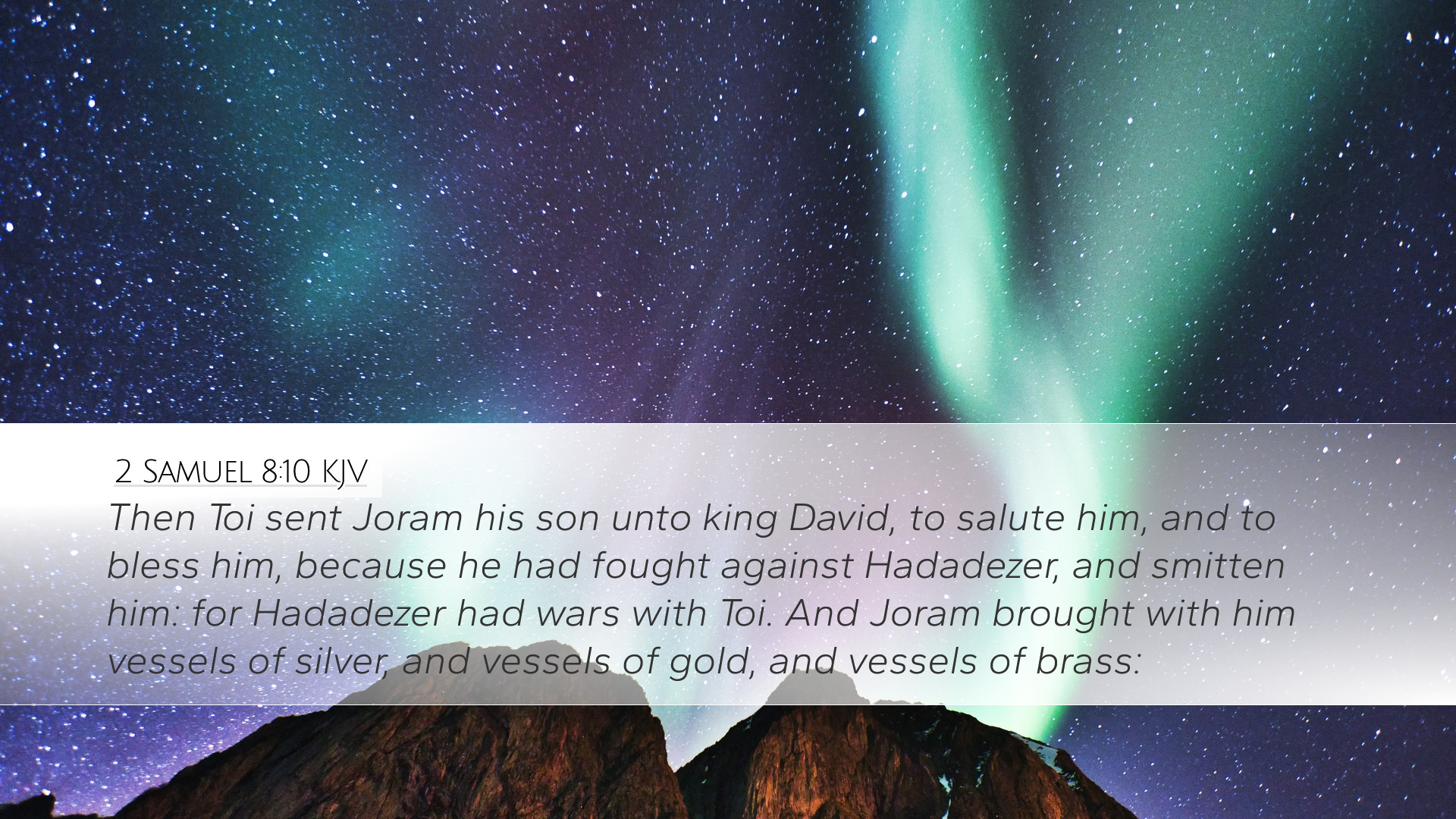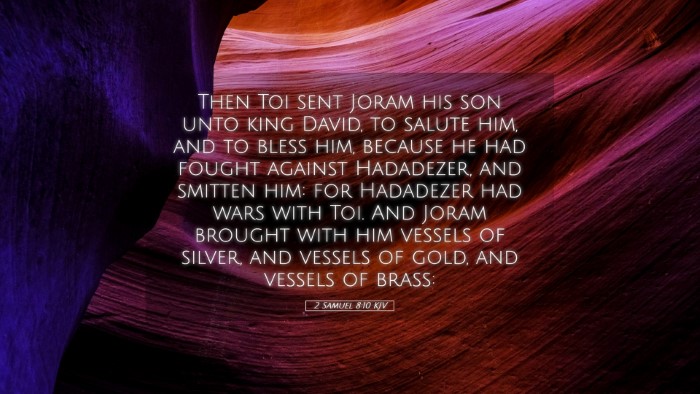Old Testament
Genesis Exodus Leviticus Numbers Deuteronomy Joshua Judges Ruth 1 Samuel 2 Samuel 1 Kings 2 Kings 1 Chronicles 2 Chronicles Ezra Nehemiah Esther Job Psalms Proverbs Ecclesiastes Song of Solomon Isaiah Jeremiah Lamentations Ezekiel Daniel Hosea Joel Amos Obadiah Jonah Micah Nahum Habakkuk Zephaniah Haggai Zechariah Malachi2 Samuel 8:10
2 Samuel 8:10 KJV
Then Toi sent Joram his son unto king David, to salute him, and to bless him, because he had fought against Hadadezer, and smitten him: for Hadadezer had wars with Toi. And Joram brought with him vessels of silver, and vessels of gold, and vessels of brass:
2 Samuel 8:10 Bible Commentary
Commentary on 2 Samuel 8:10
Verse: 2 Samuel 8:10 - "He sent his son Hadoram to king David, to inquire of his welfare, and to congratulate him because he had fought valiantly against Hadadezer and smitten him: for Hadadezer had warred with Tob." (KJV)
Introduction
2 Samuel 8:10 serves as a pivotal verse in the narrative of David's reign, marking a moment of international recognition of David's power and success as a military leader. Understanding this verse involves looking at the historical context of David's conflicts, the significance of his victories, and the implications of diplomatic relations in the ancient Near East.
Contextual Background
This verse comes soon after David's consolidation of power over Israel and his military campaigns against various neighboring nations. Hadadezer, king of Zobah, had been a formidable opponent, and David's victory over him not only expanded Israel's territory but also demonstrated David's military prowess. Furthermore, the arrival of Hadoram, a son of Hadadezer, signifies the importance of diplomatic communications during this period.
Insights from Matthew Henry
Matthew Henry highlights the significance of Hadoram’s visit in his exposition. He notes that this act symbolizes a peace offering and acknowledges David’s strength:
- Diplomatic Engagement: Hadoram’s actions indicate a recognition of David's authority and a desire for peace after conflict.
- Crowning Achievements: David’s victory not only brings glory but also possible vassalage of neighboring kings, which was a common practice in ancient times.
- God's Favor: Henry emphasizes that David's victories were attributed to God's promise and support for Israel, thus enhancing the theological understanding of divine involvement in human affairs.
Insights from Albert Barnes
Albert Barnes elaborates on the diplomatic implications of Hadoram's visit. He captures the essence of this encounter as follows:
- Strength Recognition: Barnes observes that Hadoram’s visit serves to recognize and honor David’s achievements, which is a common practice among kings.
- Peace Through Acknowledgment: The congratulatory message and inquiry for welfare suggest an understanding that peace is maintained through mutual recognition and respect among rulers.
- Historical Context: The historical narrative shows that such practices not only served to establish relationships but were critical in preventing further conflicts.
Insights from Adam Clarke
Adam Clarke provides a more nuanced analysis of this verse, focusing on the broader implications for David and the kingdom of Israel:
- Symbol of Tribute: The visit of Hadoram is seen as a form of tribute, signaling that other nations acknowledge Israel's supremacy under David’s leadership.
- Political Strategy: Clarke indicates that strategic alliances and engagements were essential in ancient Near Eastern politics, and Hadoram's action reflects a step towards stability.
- Impact on Israel's Future: Such interactions were crucial for establishing the future son of David’s empire, as they set a precedent for further conquests and diplomatic relations.
Theological Considerations
Beyond the historical and political implications, the theological significance of 2 Samuel 8:10 offers profound insights:
- God's Sovereignty: The narrative emphasizes God's hand in David's victories, underscoring a foundational theme in the Hebrew Scriptures: the sovereignty of God over nations.
- Covenantal Signs: David’s rise as king represented a fulfillment of God’s covenant promises, and this acknowledgment from foreign kings serves as validation of those promises.
- Lessons for Leadership: The encounter teaches modern leaders about the importance of humility and recognition of others, even in positions of power.
Concluding Thoughts
In summary, 2 Samuel 8:10 is rich in meaning and significance, revealing aspects of diplomacy, recognition, and the divine endorsement of leadership. The commentaries from Matthew Henry, Albert Barnes, and Adam Clarke collectively provide valuable insights that enhance our understanding of this verse within the broader narrative of the Scriptures. As pastors, theologians, and students engage with this text, they are invited to reflect on its implications for leadership, divine sovereignty, and the nature of God's dealings with His people.


